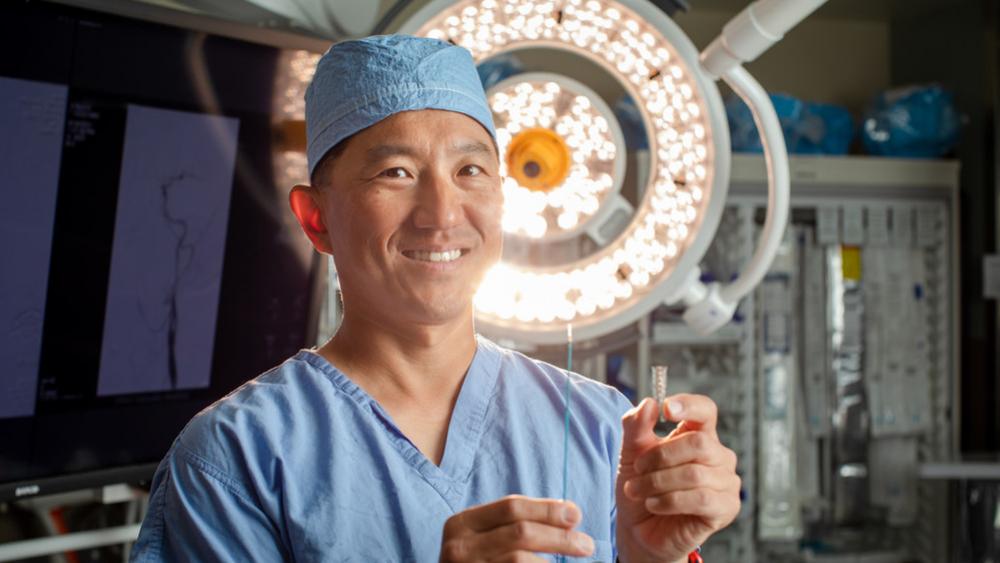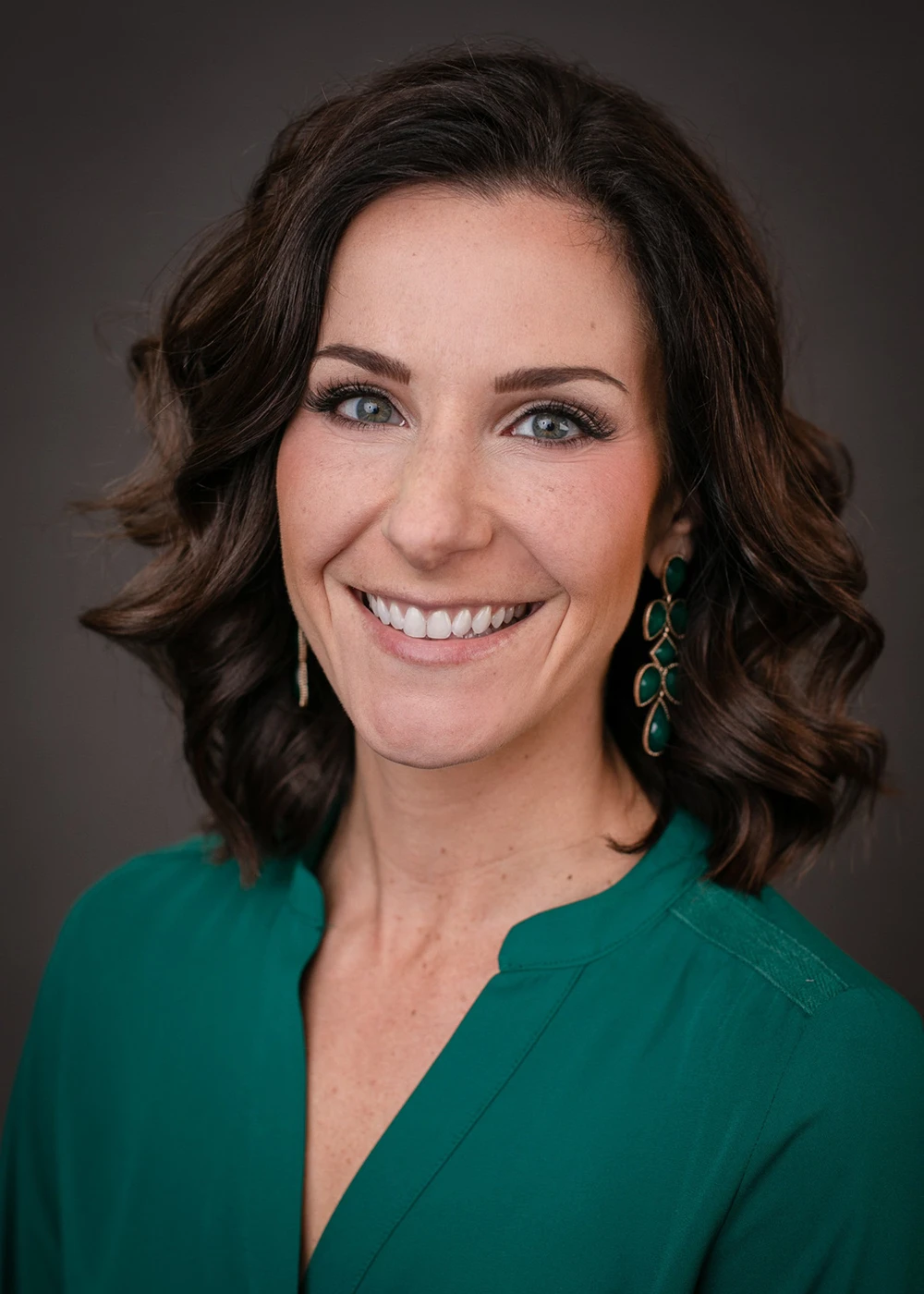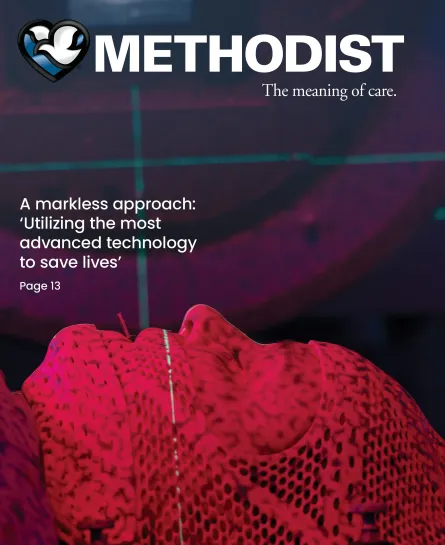





The Meaning of Care Magazine
‘Head and Shoulders Above the Rest’: Achieving Vascular Excellence Through Advanced Technology and Compassionate Care
Published: Aug. 24, 2021

With her 45th birthday just a couple days away, Stephanie Flansburg was looking forward to a night out with her girlfriends – something she doesn’t often find time for as a single working mother of two.

And for someone who often has difficulty finding the right words, she’s able to illustrate that pre-birthday celebration perfectly – up until the moment it wasn’t so perfect.
“We had a couple drinks before grabbing a bite to eat,” she said. “We ordered. We were sitting there chatting. Suddenly, I just didn’t feel right. I kept seeing these floaters in my left eye. It was just … I don’t know. A bizarre feeling. I can’t explain it.”
She retired early that night, but the next morning, “I felt normal.”
So, she got started on some laundry, and that’s when it hit her: “Just super dizzy. Almost like vertigo.”
She awoke hours later to her son asking about dinner.
“I told him, ‘I’m fine. I’m fine.’ That’s all I could say – those two words, over and over again. Eventually, he asked me, ‘Hey, Mom, what’s my name?’ And again, I said, ‘I’m fine.’”
Where She Needed To Be
Stephanie’s son, 19 at the time, notified his younger sister that they needed to get to a hospital – and fast.
“I didn’t fight him on it,” Stephanie said. “I knew something wasn’t right.”
But the fact that he drove to the Methodist Hospital Emergency Department, Stephanie said, is somewhat peculiar.
“We weren’t really a Methodist family,” she admitted. “I didn’t even have a primary care doctor at the time.”
But Stephanie was right where she needed to be on Feb. 8, 2020 – the day before her birthday. Despite the urgency of the emergency staff members assessing her, Stephanie felt a sense of peace about where she was. She was immediately admitted to the Critical Care Unit, where she met vascular surgeon John Park, MD.
“We identified that she had a carotid artery dissection – or tearing – due to the artery being stretched too thin,” Dr. Park said. “And in a young, healthy person, that’s a horrible thing. A dissection stops blood flow to the brain, and that obviously led to her issues. She had a stroke.”
A Better, Safer Option
Dr. Park took his time with Stephanie – discussing her situation, laying out her options and explaining his recommendation: transcarotid artery revascularization (TCAR).

TCAR, an innovative, minimally invasive stenting procedure reverses blood flow and filters out tiny particles of plaque or clots that would otherwise travel upward and potentially embolize in the brain. Before 2015, the only two options for patients battling carotid artery disease were open surgery and catheter-based stenting, which both come with a high risk of stroke, bleeding complications and nerve injuries.
“Across the board, TCAR has shown to be better and safer than the other two procedures,” said Dr. Park, who was first in the area to perform TCAR procedures in August 2018.
Up until Stephanie’s 45th birthday, Dr. Park had never treated a dissection with TCAR. Again, the procedure is typically used to treat carotid artery disease – or a buildup of plaque in the carotid artery.
“But he was confident that it was my best chance at seeing a better and quicker recovery,” Stephanie said.
“Dissections can cause significant disabilities,” Dr. Park said. “Some people never regain speech. Most people never get back to the workforce. Some people lose complete motor function of their arms or legs.”
And those were fears for Stephanie, who’s been doing what she loves – professionally and recreationally – for the past several years.
With math being one of her strong suits, the former salon manager sought a new challenge after her divorce in 2010 and went back to school to study accounting, eventually becoming an enrolled agent. After her stroke, she could barely tackle simple addition. And as an avid cyclist – one who’s long participated in RAGBRAI and completed all 468 miles of the route in 2018 – she wondered whether she’d ever ride again.
Her greatest fear, though, came when Dr. Park spoke openly and honestly about the surgical risks involved, including the rare possibility of death.
“And that’s when I really got emotional,” Stephanie said as she tried to hold back tears. “Because I didn’t know if that was the last time I was going to see my kids. I mean, I’m it for my kids. I’m all they’ve got.”
High Quality = High Volume
Stephanie’s birthday procedure went “flawlessly,” Dr. Park said – something he wasn’t exactly surprised by.
“In my opinion, we’re heads and shoulders above the rest when it comes to the outcomes we achieve,” he said of Methodist’s Vascular and Vein Program.
According to the Society for Vascular Surgery Vascular Quality Initiative®, which aims to improve vascular care nationwide, Methodist’s most current inpatient stroke and mortality rates following a TCAR procedure (0%) are better than national averages, which range from 1.4% to 2.1%. And over the past few years, Dr. Park and vascular surgeon Anjan Talukdar, MD, have made Methodist Hospital the highest-volume TCAR center in the area.
“TCAR aside, Methodist performs the most surgeries in the city by far,” Dr. Park said. “That’s not coincidence. That’s the result of having the latest and greatest technology and giving our patients a certain amount of attention and compassion that’s incomparable to anywhere in the nation, I’d argue. That’s simply the standard at Methodist – to do and use whatever it takes to achieve the highest quality of care.”
Because of their high patient volumes and successful outcomes, Dr. Park and Dr. Talukdar have been given Clinical Operator of Experience designations by Silk Road Medical Inc., the medical device company that developed TCAR.
“This means that our TCAR patients are guaranteed to receive the best care possible,” Dr. Talukdar said. “At par with any other institution that’s home to providers with the same designation.”
“Me Again”

Thanks to months of speech and occupational therapy, Stephanie’s back to working full-time. Her math skills have returned, and she’s returned to her bike. The now “Methodist lifer” has established primary care with Methodist Physicians Clinic internist Andy Welstead, DO, and she still sees Dr. Park for annual follow-ups.
“Stephanie is a special patient for me,” Dr. Park said. “Sure, she was my first TCAR recipient for a dissection, but I clearly remember that she was out celebrating her 45th birthday. This normal, healthy person, was celebrating an enjoyable moment in her life, and something horrible happened to her. Something that could have changed the course of her life forever.”
“On a good day, I’m about 96%,” Stephanie said. “There are still things I struggle with, especially wrapping my head around new information. Like all the new tax laws this year – those were fun.”
But she hasn’t lost her sense of humor. And if anything, she’s gained a deeper appreciation for the people in her life, including everyone on her Methodist care team. While she admits there are likely better words to describe her experience, she said it’s one that fills her with “just a lot of gratitude.”
“Because that’s what it was – The Meaning of Care. That’s how everybody treated me. Everybody truly seemed to care what I was going through. Despite all the patients they have, they still gave me that next-to-none care. And now, I’m me again. I get to continue being it for my kids.”
More Resources
- Read more from the summer 2021 issue of The Meaning of Care Magazine.
- Learn more about Methodist’s Vascular and Vein Program.
- Learn more about the TCAR procedure.


